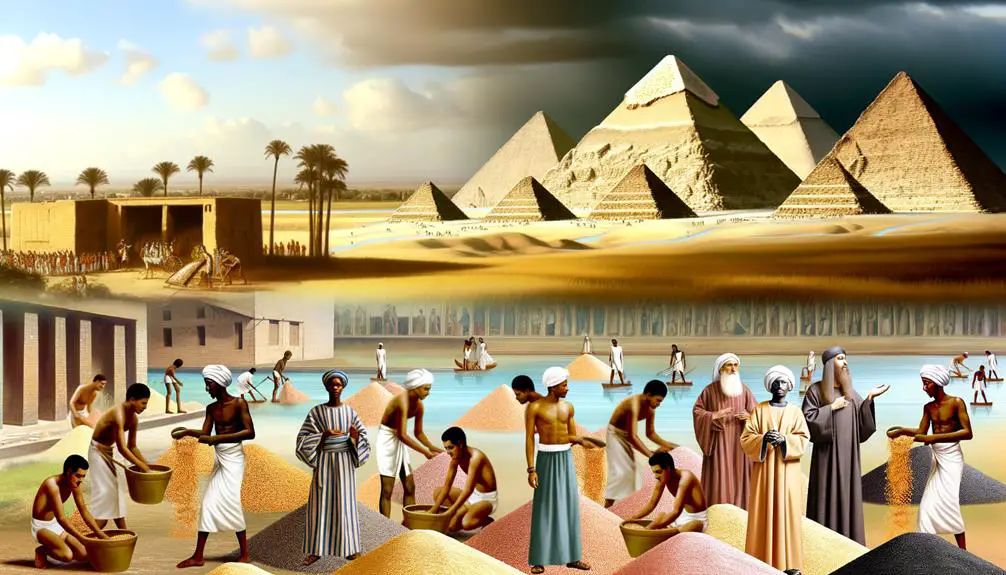Navigate through biblical wisdom on planning and discover how ancient strategies can illuminate your path to a more prepared and purposeful life.

Planning in the Bible
Have you ever considered how the Bible, an ancient document, offers timeless wisdom on planning?
You'll find that its pages are not just about faith and morality but also about strategic foresight, from Joseph's grain storage to Jesus advising on counting the cost before building.
These narratives don't just tell us what happened; they invite you to reflect on your approach to planning in your life.
Exploring these stories might just reveal insights into managing resources, preparing for the future, and making wise decisions.
So, let's embark on this journey together, and perhaps, find a blueprint for our own plans.
Key Takeaways
- Biblical narratives, like Joseph's grain management, emphasize the importance of strategic planning for economic resilience and family unity.
- Proverbs and teachings highlight the necessity of divine guidance, meticulous planning, and prioritization in decision-making processes.
- Jesus's teachings on counting costs and war strategy underscore the importance of preparedness, foresight, and evaluating risks in planning.
- Strategic planning in the Bible showcases how crises can be transformed into opportunities for growth, unity, and achieving personal and communal goals.
Joseph's Strategic Grain Management

Joseph's strategic grain management, as recounted in the Book of Genesis, showcases a pioneering approach to crisis mitigation through the accumulation and judicious distribution of resources. This narrative not only reflects his remarkable economic foresight but also sets a foundational precedent for modern principles of resource management and crisis preparedness. By interpreting Pharaoh's dreams as a prophecy of seven years of abundance followed by seven years of famine, Joseph's actions underline the critical importance of planning for economic downturns (Genesis 41:28-36).
Your understanding of this biblical account reveals how Joseph's strategies weren't merely about survival but also about establishing a sustainable framework for the future. The accumulation of grain during years of abundance and its strategic distribution during famine years ensured not only the survival of Egypt but also positioned it as a place of refuge and resource for surrounding nations. This act of foresight and planning reflects a deep understanding of economic cycles and the necessity of preparing for them.
Moreover, Joseph's approach facilitated family reconciliation, a subplot that underscores the broader implications of strategic planning. By providing for his family and others in times of need, Joseph not only secured his people's survival but also healed familial rifts, showcasing the unifying power of well-managed resources (Genesis 45:4-8).
In examining Joseph's strategies, you're encouraged to see beyond their historical context. His story exemplifies how economic foresight, coupled with compassionate leadership, can lead to not just survival, but also to reconciliation and prosperity. Joseph's narrative serves as a testament to the enduring relevance of strategic planning and its potential to transform crises into opportunities for unity and growth.
Proverbs on Wise Planning

Building on the foundation laid by Joseph's strategic foresight, the Book of Proverbs further enriches our understanding of wise planning through its succinct and profound teachings on the subject. This wisdom literature, rich in metaphor and practical advice, offers you timeless principles for navigating life's uncertainties with future foresight and decision-making wisdom.
Here's a closer look at how Proverbs addresses wise planning:
Proverb |
Interpretation |
|---|---|
Proverbs 16:3 |
Entrust your activities to the Lord, and your plans will be established, highlighting the importance of divine guidance in planning. |
Proverbs 21:5 |
The plans of the diligent lead surely to abundance, but everyone who is hasty comes only to poverty, emphasizing the value of diligence and thoughtful planning over rash actions. |
Proverbs 24:27 |
Prepare your work outside; get everything ready for yourself in the field, and after that build your house, advising on the significance of preparation and setting priorities right. |
Proverbs 27:12 |
The prudent see danger and hide themselves, but the simple go on and suffer for it, underscoring the importance of anticipating potential pitfalls and planning accordingly. |
These verses collectively underscore the necessity of foresight, the virtue of patience, the wisdom in prioritizing tasks, and the prudence of anticipating and preparing for potential challenges. They teach you that successful planning involves a blend of practical wisdom, diligent work, and a discerning spirit, principles that remain relevant in today's fast-paced world. Through these teachings, the Book of Proverbs provides a blueprint for effective decision-making and planning, rooted in wisdom and insight.
Nehemiah Rebuilds Jerusalem

In the narrative of Nehemiah rebuilding Jerusalem, we observe a meticulous demonstration of strategic planning and communal effort, embodying the principles of foresight and collaboration in the face of formidable challenges. Nehemiah's approach to reconstructing the city's walls, as recounted in the Book of Nehemiah, offers a vivid illustration of overcoming political opposition through astute leadership and fostering community involvement to achieve a common goal.
Nehemiah, serving as cupbearer to King Artaxerxes of Persia, learns of Jerusalem's dilapidated state and is moved to action. He prays and plans before seeking and obtaining the king's permission to rebuild Jerusalem's walls (Nehemiah 2:4-8). This initial phase highlights the importance of prayerful preparation and securing support from governing authorities, even in the face of potential political opposition.
Upon arrival in Jerusalem, Nehemiah conducts a covert inspection of the walls, a strategic move demonstrating the value of personal assessment and understanding of a project's scope before its commencement (Nehemiah 2:11-15). He then rallies the local community, emphasizing the critical role of community involvement in rebuilding efforts. Despite facing mockery, threats, and attempts at sabotage from neighboring adversaries (Nehemiah 4), Nehemiah ingeniously organizes the people by families to rebuild specific sections of the wall, thereby personalizing the task and enhancing their commitment to the project (Nehemiah 3).
This narrative underscores that effective planning involves not just the anticipation of obstacles but also the mobilization of communal resources and resilience to surmount them. Nehemiah's story is a testament to the power of collective action underpinned by strategic foresight and leadership in overcoming political opposition and achieving significant communal objectives.
Preparing the Temple With David

Much like Nehemiah's strategic approach to rebuilding Jerusalem's walls, King David's preparation for the construction of the Temple showcases meticulous planning and divine consultation, reflecting a profound understanding of leadership and dedication to a sacred cause. David's approach to preparing for the Temple's construction is a testament to the importance of combining human effort with divine guidance in achieving monumental tasks. His preparations can be distilled into three major actions:
- Gathering Resources: David amassed vast quantities of materials such as gold, silver, bronze, iron, wood, and precious stones. This wasn't just an act of accumulation but a strategic collection of high-quality resources, ensuring the Temple's grandeur and durability.
- Securing Artistic Contributions: Recognizing the Temple's significance as a divine dwelling place, David enlisted skilled craftsmen and artists to contribute to its construction. These artistic contributions weren't merely for aesthetic appeal but served to honor God through excellence and beauty in craftsmanship.
- Following Divine Instructions: Perhaps most crucially, David didn't proceed solely on his own understanding but sought and followed divine instructions for the Temple's design. This obedience to divine guidance underscores the biblical principle that successful planning involves seeking and adhering to God's will above all.
David's preparatory work for the Temple not only demonstrates his commitment to a sacred cause but also serves as a biblical model for planning that balances human initiative with divine direction. His legacy, through these actions, emphasizes the value of meticulous planning, dedication to artistic excellence, and, above all, adherence to divine instructions in accomplishing tasks that honor God.
Jesus Teaches on Counting Costs

Reflecting on Jesus's teachings, one finds a pivotal lesson in the necessity of counting costs before embarking on any significant endeavor, a principle that underscores the broader biblical ethos of thoughtful and deliberate planning. Jesus uses vivid imagery to drive home the importance of this principle, notably through the examples of tower building and preparing for war. These narratives, found in the Gospel of Luke, serve not only as metaphors for the spiritual journey but also offer pragmatic advice for life's temporal pursuits.
Example |
Lesson |
|---|---|
Tower Building (Luke 14:28-30) |
Before laying the foundation, one must ensure they have the resources to complete the task, lest they face public humiliation for starting what they can't finish. |
War Strategy (Luke 14:31-32) |
Similarly, a king must evaluate whether his army can oppose an advancing force, highlighting the importance of strategic planning and assessment of one's capabilities. |
These teachings encourage you to approach your commitments and projects with foresight and prudence. Jesus's emphasis on counting costs transcends the literal interpretation of financial planning, delving into the broader concept of preparedness and the weighing of consequences. This approach is not only wise but essential for the successful realization of goals, be they spiritual, personal, or professional. As you reflect on these teachings, consider how they apply to your own life. Are you counting the costs, assessing risks, and planning accordingly? Jesus's lessons on tower building and war strategy offer timeless guidance on the importance of deliberate and informed decision-making.
Frequently Asked Questions
How Does the Concept of Planning in the Bible Relate to Modern Project Management Techniques?
When you examine modern project management techniques, you'll find that strategic foresight and visionary leadership are core components. These elements align with planning principles found in historical texts, suggesting a timeless relevance.
Are There Examples in the Bible Where Plans Failed Due to Lack of Faith or Disobedience, and What Can We Learn From Them?
You're exploring how failures, like Moses' impatience or Jericho's misguided strategy, highlight the consequences of doubt and disobedience. These narratives serve as cautionary tales, teaching that faith and adherence to guidance are crucial for success.
Analyzing these events, you'll find that every misstep rooted in disbelief teaches valuable lessons on the importance of trust and strategic planning, underscoring the timeless wisdom embedded in these ancient lessons.
How Does the Bible Address the Balance Between Divine Providence and Human Planning Efforts?
You're exploring how divine sovereignty and human responsibility coexist, especially in decision-making.
The Bible illustrates this balance, showing that while God's providential plans are supreme, He also expects you to engage actively in planning and decision-making (Proverbs 16:9).
This dynamic encourages you to trust in God's overarching plan, yet also recognize your role and responsibility in the process, blending faith in divine guidance with practical steps towards achieving goals.
In What Ways Does the Bible Suggest Involving Community or Others in Personal or Group Planning Efforts?
When you're planning, involving others is crucial. Community consultation and collective decision-making aren't just practical; they're essential for well-rounded plans.
This approach ensures diverse perspectives and shared responsibilities. By actively seeking input and collaborating, you create plans that are more likely to succeed and be accepted by all involved.
This method of planning emphasizes the importance of every voice and the collective wisdom in making informed, balanced decisions.
How Does the Concept of Rest, as Observed in the Sabbath, Integrate With the Biblical Perspective on Planning and Work?
In integrating rest with planning and work, the concept of the Sabbath emphasizes the necessity of restorative sleep and mindful meditation. It's not merely about ceasing labor but engaging in activities that replenish and prepare you for upcoming tasks.
This approach underlines a balanced lifestyle, asserting that effective planning includes periods of rest to ensure mental and physical health, thereby enhancing productivity and creativity in your endeavors.
Conclusion
In essence, the biblical narratives from Joseph's foresight in Egypt to Jesus' parables underscore a divine blueprint for mindful preparation (Gen. 41, Luke 14:28).
These stories don't merely recount historical or spiritual events; they're allegories for life's prudence.
As Proverbs 21:5 advises, diligent planning leads to abundance.
Thus, in weaving these ancient threads, we're reminded that wisdom isn't just knowing but planning – a testament to the timeless adage that the wise build their houses on rock, not sand (Matt. 7:24).



Sign up